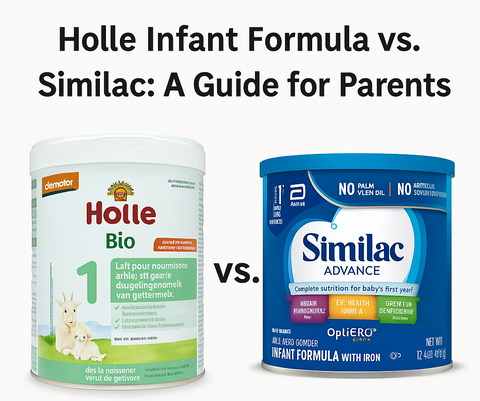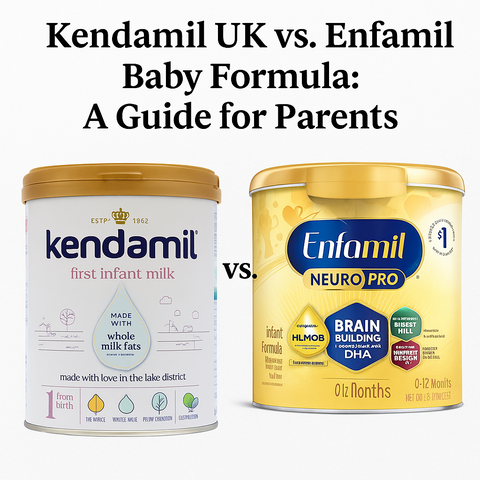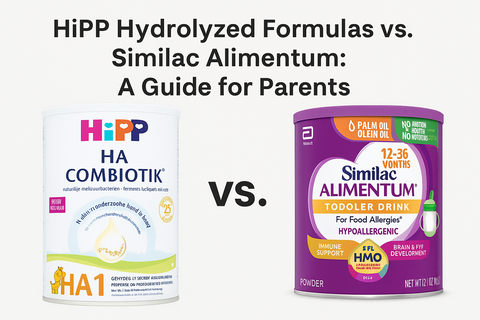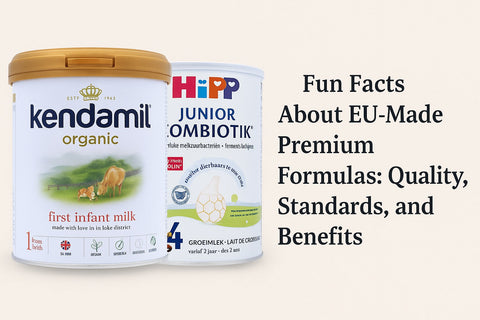GMOs Explained in Baby Formula
Choosing the right baby formula can be an overwhelming task for parents. With so many options available on the market, it takes time to navigate through the various ingredients and labels to make an informed decision. One topic that often arises in discussions about baby formula is the presence of GMOs (Genetically Modified Organisms). But what is GMO in formula, and are GMOs really a cause for concern? In this article, we'll delve into the world of GMOs in baby formula to uncover the truth behind their presence and help you make the best choice for your little one.
GMOs: History and what is it exactly?
GMOs, or Genetically Modified Organisms, arose from advancements in genetic engineering, enabling scientists to manipulate the genetic material of organisms for agricultural purposes. Beginning in the 1970s, researchers developed techniques to transfer genes between organisms, creating GMO crops with traits like pest resistance and enhanced nutritional content. The adoption of GMO crops accelerated in the late 1990s and early 2000s, offering benefits such as increased yields, reduced pesticide use, and improved crop resilience.
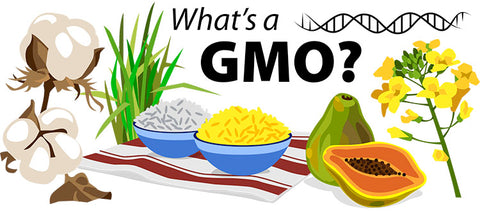
As mentioned before, GMOs are living organisms whose genetic material has been changed using genetic engineering techniques. This alteration allows scientists to introduce desirable traits into the organism, such as resistance to pests, herbicide tolerance, or improved nutritional content.
Genetic modification can involve the transfer of genes between different species that would not naturally breed in traditional breeding methods. For example, genes from a bacterium might be inserted into a crop plant to confer resistance to insect pests.
GMOs are commonly used in modern agriculture, with many genetically modified crops grown worldwide. Common GMO crops include corn, soybeans, canola, and cotton. These crops are often used in processed foods, animal feed, and other products.
While GMOs have been the subject of much debate and controversy, proponents argue they offer benefits such as increased crop yields, reduced pesticide use, and improved nutritional content. Critics raise concerns about potential health risks, environmental impacts, and ethical considerations associated with genetic engineering.
Overall, the regulation and labeling of GMOs vary by country, and opinions on their safety and utility differ among scientists, policymakers, and the public.
Why are GMOs found in infant formulas?
Genetically modified organism infant formula is available on the market due to several factors:
- Ingredient Sourcing: Many infant formula manufacturers use ingredients derived from genetically modified crops. These ingredients are commonly used in formula production due to their nutritional content and availability.
- Cost and Efficiency: Genetically modified crops are often more cost-effective and efficient to grow than non-GMO counterparts. This can result in lower production costs for infant formula manufacturers, making GMO ingredients an attractive choice for formulating affordable products.
- Improved Shelf Life: GMOs can also be engineered to resist spoilage and degradation, extending the shelf life of infant formula and reducing the risk of contamination by harmful microorganisms. Enhanced shelf life ensures infant formula remains safe for longer periods, especially in regions with limited access to fresh or refrigerated products.
- Supply Chain Considerations: The widespread use of GMO crops in agriculture means that GMO-derived ingredients are prevalent in many food products, including infant formula. Manufacturers may choose GMO ingredients to ensure a consistent and reliable raw materials supply chain.
GMOs in formula: Should parents be worried?
In recent years, scientists, pediatricians, and healthcare professionals have expressed growing concerns about the presence of genetically modified organisms in infant formula. These worries come from several factors related to potential health implications, environmental impacts, and ethical considerations. Here are some of the main concerns about the potential dangers of GMOs in infant formula:
- Transparency and Labeling: One of the primary concerns for parents is the lack of transparency regarding GMOs in the formula. Unlike EU organic products, which are subject to strict labeling requirements, US regulations do not mandate specific labeling of GMO ingredients in formulas. This lack of transparency makes it difficult for parents to make informed choices about the products they feed their infants. (Later on in this blog, more about this!)
- Allergenicity: Allergenicity refers to the potential of a substance to trigger an allergic reaction in individuals who are sensitive or allergic to it. In the context of babies, allergenicity is a significant concern because infants' immune systems are still developing and may be more susceptible to allergic reactions compared to older children and adults.
- Unknown Long-Term Health Effects: GMOs have not been widely used long enough for us to understand their long-term effects on human health fully. Critics argue that genetic modifications may have unforeseen consequences that could impact health in ways that are not yet understood.
- Resistance to Antibiotics: Antibiotic resistance is an issue of concern that affects individuals of all ages, including babies and infants. Antibiotic resistance occurs when bacteria evolve and become resistant to the effects of antibiotics, making infections more difficult to treat and increasing the risk of complications. Babies, in particular, can be vulnerable to antibiotic-resistant infections due to their developing immune systems and increased susceptibility to bacterial illnesses.
- Environmental Concerns: While not directly related to infant health, some critics of GMOs are concerned about the environmental impacts of genetically modified crops, including increased pesticide use, potential harm to non-target organisms, and the development of herbicide-resistant weeds.
Ultimately, parents should consider the available scientific evidence, their own values and beliefs, and consult their pediatrician when deciding on infant formula and other food choices for their children.
Good to know:
In Europe, organic for infant formula certification set by the European Food Safety Authority (EFSA) automatically implies a GMO-free status. This is because European organic regulations strictly prohibit the use of genetically modified organisms. So, even if a product doesn't advertise its GMO-free status, as long as it's certified organic in Europe, it won't contain GMOs!
How to Identify GMOs in Baby Formula

As mentioned earlier, identifying genetically modified organisms in baby formula can be challenging for parents due to the complexity of food labels and the use of misleading marketing jargon. However, some key strategies can help you navigate the process of identifying GMO ingredients in baby formula:
- Read Ingredient Lists: One of the most effective ways to identify GMOs in baby formula is to read the ingredient list on the product packaging carefully. Look for common GMO ingredients such as soy protein, corn syrup, and various sugars derived from genetically modified crops. Ingredients such as soybeans, corn, and sugar beets are often genetically modified, so checking for these items on the label is essential.
- Look for GMO-Free or Non-GMO Project Verified Labels: Some baby formula brands voluntarily label their products as GMO-free or obtain certification from organizations like the Non-GMO Project. Products bearing the Non-GMO Project Verified seal have undergone third-party verification to ensure compliance with rigorous GMO avoidance standards. Look for these labels on baby formula packaging as an indication that the product is free from GMO ingredients.
- Beware of Misleading Marketing Jargon: Some manufacturers may use misleading marketing terms and jargon to create the impression of a GMO-free product without actually meeting stringent standards. Terms like "natural," "pure," or "wholesome" are not regulated and do not guarantee that the product is free from GMOs. Be wary of vague or ambiguous claims and focus on verifiable certifications and labels.
- Contact the Manufacturer or Organic Formula Shop: If you have specific questions about a particular baby formula's ingredients or sourcing practices, don't hesitate to contact the manufacturer for clarification. Many companies are transparent about their ingredient sourcing and are willing to provide information to concerned consumers.
The difference between organic, non-GMO, or regular baby formula
When choosing baby formula, parents often encounter terms like organic, non-GMO, and regular (which may contain GMO ingredients). Our EU Organic formulas are always free of GMO ingredients. But US-made non-GMO formulas are not automatically organic. Yes, that’s a bit confusing! Understanding the differences between these types of formulas can help parents make informed decisions about what is best for their baby's nutrition and well-being.
- Regular Baby Formula: Regular baby formula, also known as conventional formula, is widely available in the market. It may contain ingredients derived from genetically modified organisms (GMOs), such as soy protein, corn syrup, and sugars from genetically modified corn or sugar beets. Using GMO ingredients in regular baby formula is common, and it is not required to be labeled as containing GMOs in the United States.
- Non-GMO Baby Formula: Non-GMO baby formula is formulated without genetically modified organisms. While it does not contain GMO ingredients, non-GMO formula is not necessarily organic. Non-GMO formulas may still contain conventional (non-organic) ingredients but specifically exclude genetically modified ones. Non-GMO formulas may carry labels indicating that they are "Non-GMO" or "GMO-Free," comforting parents concerned about the presence of GMOs in their baby's formula.
- EU Organic Baby Formula: The Organic Baby Formulas we carry at Organic Formula Shop are produced using ingredients that are certified organic, meaning they are grown and processed without the use of synthetic pesticides, fertilizers, genetically modified organisms, or irradiation. Furthermore, the milk used in these certified organic formulas comes from biodynamic farms that use chemical-free agricultural practices that respect animal welfare and environmental sustainability. Milk from happy cows!
When choosing between organic, non-GMO, and regular baby formula for your little one, decide on your preferences, values, and any specific dietary or health concerns. It's essential to carefully read labels, understand certifications, and consult your pediatrician to ensure the formula meets your baby's nutritional needs.
What Is Organic Baby Formula?

Organic baby formula is an infant formula made from certified organic ingredients. This means that the ingredients used in organic baby formula are grown and processed without the use of synthetic pesticides, herbicides, fertilizers, GMOs, antibiotics, growth hormones, or irradiation.
Here are some key characteristics and features of organic baby formula:
- Certified Organic Ingredients: European-made Organic Formulas like HiPP, Holle, Lebenswert, and BebeM adhere to stringent regulations set by the European Food Safety Authority (EFSA). The EFSA establishes rigorous standards, ensuring these formulas are free from harmful substances. These brands prioritize organic, high-quality ingredients that meet or exceed EU certification requirements. The commitment to purity, strict oversight, and compliance with high-set safety measures contribute to their reputation for producing safe and reliable infant formulas.
- Non-GMO: Organic baby formula is always free of genetically modified organisms (GMOs).
- No Synthetic Additives: Organic baby formula is made without synthetic additives, including artificial flavors, colors, preservatives, and sweeteners. Instead, organic formulas use natural ingredients to provide essential nutrients for infant growth and development.
- Environmentally Friendly: Organic farming practices prioritize environmental sustainability and animal welfare. Organic farms use crop rotation, composting, and natural pest control to maintain soil health and biodiversity while minimizing synthetic chemicals and fertilizers.
- Stringent Production Standards: Organic baby formula manufacturers must adhere to strict production standards and undergo regular inspections to maintain organic certification. This ensures the formula meets quality and safety requirements throughout production. Check out this blog to explore why EU Formulas are so safe!
- Health and Safety: Organic baby formula is formulated to meet the nutritional needs of infants, providing essential vitamins, minerals, proteins, fats, and carbohydrates for healthy growth and development. Organic formulas are carefully balanced to resemble the composition of breast milk as closely as possible.
Organic European Vs. Organic American Formula
What makes European formulas so good? Well, Not all organic products are created equal. The guidelines for baby formulas set by The European Food Safety Authority (EFSA) are way stricter than the regulations set by the FDA.
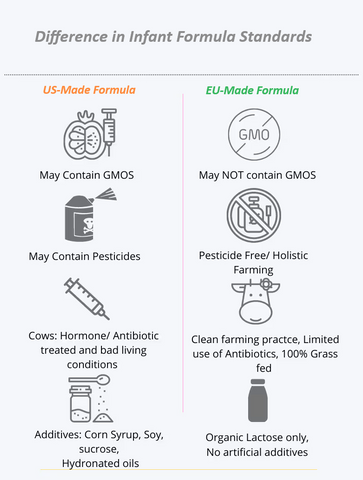
European baby formula manufacturers use cleaner ingredients and follow stricter regulations regarding nutrient composition, usage, and nutrients than American formulas. The ingredients used are often cleaner and of a higher quality.
Here are some key differences you can find in European baby formulas vs. American baby formulas:
- US formulas only contain 70% organic ingredients, unlike European formulas, which contain 95% organic ingredients
- European formulas must have at least 30% of calories from lactose, which is not required for U.S.-manufactured formulas.
- EFSA standards prohibit the inclusion of sucrose (table sugar) in baby formula, except in small quantities in some specialty formulas for premature (Preemie) infants or infants with allergies.
- Certified " Organic" by the EFSA means that the formulas contain no GMOs, pesticides, hormones, or steroids.
Overall, organic baby formula offers you, as a parent or caregiver, a natural and wholesome option for feeding your little one infants, free of synthetic chemicals and genetically modified ingredients. While organic formulas may be more expensive than conventional options, many parents consider organic products' health and environmental benefits worth investing in their child's well-being.
Best Known EU-made Formula Brands
Now, let's take a closer look at some popular EU-organic non-GMO formula brands:
- HiPP: HiPP is a well-known German brand that produces organic baby food and formula. Their formulas are made with high-quality organic ingredients and are free from GMOs, synthetic chemicals, and artificial additives. HiPP offers a range of formula options tailored to different stages of infant development like Cow, Goat, Hydrolyzed, and Specialty Formulas like HiPP Comfort and Anti-Reflux.
- Holle: Holle is another reputable German brand specializing in organic baby food and formula. Their formulas are made with organic cow's milk or goat's milk and are free from GMOs, pesticides, and other harmful substances. Holle emphasizes DEMENTER's sustainable farming practices and environmental stewardship.
- BebeM: BebeM is a French brand known for its high-end and vegan baby formulas. It's a unique, organic-certified formula that contains no animal product or by-product. This non-dairy and vegetarian formula is conceived to answer infants' nutritional needs. BebeM formulas are designed to provide infants with balanced nutrition and support healthy digestion.
- Lebenswert: The Lebenswert brand (owned by Holle) offers organic baby formulas made with biodynamic milk from organic farms. Their formulas are free from GMOs, pesticides, and synthetic additives, providing infants with wholesome and nutritious nourishment.
EU-organic non-GMO formulas provide parents with a safe, healthy, and environmentally conscious option for feeding their infants. Brands like HiPP, Holle, BebeM, and Lebenswert prioritize quality, purity, and animal welfare in their organic formulas, offering peace of mind to parents who seek the best nutrition for their babies.
The most popular Non-GMO Formula we carry:
As one of the US's leading resellers of EU formulas, we understand the importance of offering parents reliable choices that prioritize organic ingredients and exclude genetically modified organisms (GMOs). This is our selection of the most popular non-GMO organic formula options that we carry:
#1 HiPP Dutch Organic Formula

HiPP Dutch Stage 1: for babies aged 0 - 6 months of age
HiPP Dutch Stage 2: for babies aged 6 - 12 months of age (Follow On formula)
HiPP Dutch Stage 3: for toddlers aged 12 months and up
HiPP Dutch Stage 4: for toddlers aged 24 months and up
Since day one, our Hipp Dutch formulas have been our customers' favorite and best-selling formulas. This is no surprise because these formulas have long been known as the best European formulas, and they're a kind of "golden benchmark" for organic, nutritionally complete infant cow milk formulas. The ingredients in HiPP Dutch are entirely GMO-free, meeting the European Union's strict standards for organic agriculture. It's also free from artificial preservatives. The main ingredients are organic skim milk, organic Lactose, organic whey, and organic vegetable oils. Also, they contain a wide range of vitamins, minerals, prebiotics, probiotics, and long-chain polyunsaturated fatty acids, such as DHA. It also comes in an easy-to-dispense, airtight container!
#2 HiPP Organic UK Formula

HiPP UK Stage 1: for infants aged 0 - 6 months of age
HiPP UK Stage 2: for babies aged 6 - 12 months of age (Follow On formula)
HiPP UK Stage 3: for toddlers aged 12 months and up
HiPP UK is also quite similar to HiPP Dutch. At approx half a dollar cent ($0.050) per gram, it is the best value and a healthy organic infant formula option we carry. The main difference between HiPP UK and HiPP Dutch (besides the price) is that HiPP UK contains only prebiotics and no probiotics.
#3 HiPP German Organic Formula
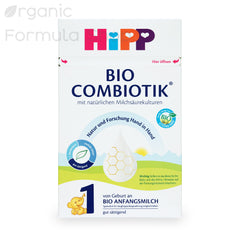
HiPP German Stage Pre: for infants aged 0 - 6 months of age
HiPP German Stage 1: for infants aged 0 - 6 months of age
HiPP German Stage 2: for babies aged 6 - 10 months of age (Follow On formula)
HiPP German Stage 3: for toddlers aged 10 months and up
HiPP German Stage formulas are a natural, easy-to-digest formula suitable from birth. It comes packed with an excellent spread of probiotics to help support your baby’s immune system and brain development. Hipp's main carbohydrate is lactose, so you won’t have to worry about unnecessary fillers. Each formula contains a wide selection of vitamins and minerals. To support immune health, vitamins A & C blend into the formula. Next, vitamin D adds to support bone health and joints. Finally, Omega 3s and 6s (DHA & ARA) combine to help the brain and muscle tissue grow.
#4 BebeM Vegan/ Plant-Based Non-GMO
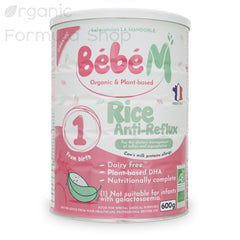
BebeM Stage 1: for babies aged 0 - 6 months of age
BebeM Stage 2: for babies aged 6 - 10 months of age (Follow On formula)
BebeM Stage 3: for toddlers aged 10+ months and up
Bebe M. is a dairy-free vegan formula range created with a unique base of 100% organic rice protein hydrolysate. Bebe M formulas are developed to provide all the vital nutrients that growing newborns require to thrive since they believe every baby deserves the best start in life. We couldn't agree more!
#5 HiPP Hydrolyzed Formula

HiPP Dutch HA Stage 1: for babies aged 0 - 6 months of age
HiPP Dutch HA Stage 2: for babies aged 6+ months of age
HiPP German HA Stage Pre: for infants aged 0 - 6 months of age
HiPP German HA Stage 1: for infants aged 0 - 6 months of age
HiPP German HA Stage 2: for babies aged 6 - 10 months of age
HiPP Hydrolyzed (HA) baby formula is casein-free and contains protein hydrolysates that break down proteins for infants with sensitive stomachs. The Hypoallergenic Formula Line from HiPP is specially developed for babies prone to allergies. Milk protein can be an essential factor in triggering allergies. The milk protein in the HiPP Hypoallergenic formulas is split into smaller molecules. HiPP HA uses a protein that is wholly hydrolyzed and was proven by studies to prevent allergies. This hypoallergenic formula has highly broken down proteins that your baby’s body is less likely to see as a threat and, thereby, is less likely to react to. We Carry the German version (in a box) and the Dutch version (in a can as displayed).
Please Note: Our HiPP HA, Comfort & Anti Reflux (AR) Formulas are technically not organic because hydrolyzing the milk protein requires more processing. However, all other ingredients included are still organic
#6 Holle Organic Goat Milk Formula
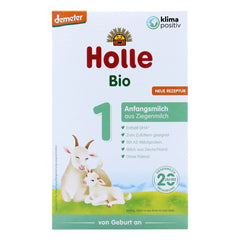
Holle Goat Stage Pre: for infants aged 0 - 6 months of age
Holle Goat Stage 1: for infants aged 0 - 6 months of age
Holle Goat Stage 2: for babies aged 6 - 12 months of age
Holle Goat Stage 3: for toddlers aged 10 months and up
Rather than resorting to a heavily processed US-manufactured formula, Holle Goat offers an alternative made with natural ingredients such as whole organic goat’s milk, organic lactose, organic maltodextrin, and a blend of organic vegetable oils. Click here to see our whole range of Holle Goat Formulas.
Making an Informed Choice for Your Baby

Making an informed choice for your baby's nutrition is one of the most important decisions you'll make as a parent. From selecting the right formula to understanding its ingredients and certifications, several factors must be considered to ensure your baby receives the best possible nutrition. Here are a few tips to help you make an informed choice:
- Understand Your Baby's Needs: Every baby is unique, and their nutritional needs may vary. Consider factors such as your baby's age, dietary preferences, allergies, and specific health considerations when choosing a formula.
- Read Labels Carefully: Take the time to read the ingredient list and nutritional information on the formula packaging. Look for organic and non-GMO certifications, guaranteeing the formula is made with high-quality, wholesome ingredients and free from harmful additives and genetically modified organisms.
- Consider EU-made Organic Options: EU Organic formulas are guaranteed to be produced without the use of synthetic pesticides, herbicides, GMOs, or artificial additives. Organic formula can minimize your baby's exposure to potentially harmful substances and support sustainable farming practices.
- Look for Non-GMO Verification: Non-GMO Project Verified labels indicate that the formula has undergone third-party testing to ensure it does not contain genetically modified ingredients. Opting for non-GMO formulas provides added assurance of purity and quality.
- Research Trusted Brands: Explore reputable brands known for their commitment to quality, safety, and transparency in infant nutrition. Look for brands prioritizing organic ingredients, sustainable practices, and stringent quality standards.
- Consult Healthcare Professionals: If you have questions or concerns about selecting the right formula for your baby, don't hesitate to consult with pediatricians, lactation consultants, or registered dietitians. They can provide personalized guidance based on your baby's needs and health status.
- Contact our Formula Experts: You can always contact our dedicated customer support team at Organic Formula Shop for expert advice about our Organic Infant formula and guidance tailored to your baby's needs. They have earned hundreds of 5-star reviews from our customers, helping you to provide the best nutrition for your little one. Contact us here or shoot us an email at support@organicformulashop.com
In closing, while the topic of GMOs in the formula may create concerns among parents, it's important to remember that a variety of great formula options are available to meet every child's unique needs. By staying informed and making choices aligned with your values and preferences, you provide the best possible nutrition for your newborn.
Ultimately, parents' love, care, and attention to their little ones play a crucial role in caring about their health and well-being, ensuring a bright and promising future. Together, we can do this!
Please note:
This article is not medical advice. If considering mixed feeding, seeking guidance from healthcare professionals or lactation consultants who can offer advice tailored to individual circumstances is advisable. They can provide information on introducing formula, maintaining milk supply, and meeting the baby's nutritional requirements while accommodating the parent's needs and preferences.

